


















European Conference of Tropical Ecology 2026
SPECIES-ECOSYSTEMS-PEOPLE
University of Passau
23–27 February 2026
Society for
Tropical Ecology [gtö]
#ECTE2026
Keynotes
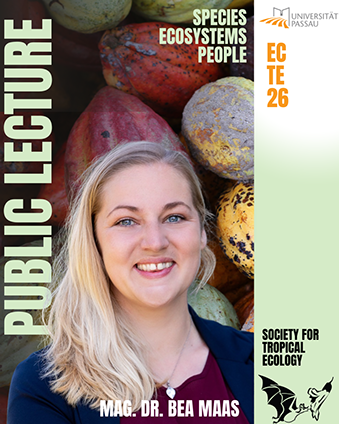
23. February 2026
Why tropical ecology matters to everyone – biodiversity, ecosystem services, and sustainability
Dr. Bea Maas (University of Vienna)
AbstractBiodiversity is the foundation of resilient ecosystem services that sustain human well-being. However, advancing impacts of intensive land use, climate change, and resource overexploitation critically threaten biodiversity - particularly in the tropics. This talk will highlight the far-reaching challenges arising from these developments as well as the opportunities tropical ecology provides for a sustainable future. We will take you on a journey from long-term research sites in Southeast Asia to South America, exploring how birds and bats shape the balance between biodiversity, ecosystem services, and agriculture. Field experiments from tropical cacao agroforestry systems show that these species can enhance yields by up to 118% through natural pest control, corresponding to nearly 960 US dollars per hectare each year. Similar results across multiple crops and regions reveal that land-use systems can be managed both profitably and biodiversity-friendly, depending on landscape context and functional diversity - often near critical ecological tipping points. Translating this knowledge into practice requires diversity at multiple levels - through the inclusion of varied communities, methods, and perspectives that bridge knowledge and implementation gaps. Such diversity can advance global Sustainable Development Goals by linking environment, society, and economy. Tropical ecology thus points the way toward our shared sustainable future. InterviewWhat are you currently working on – and what fascinates you personally about your research topic?I currently lead and co-lead research projects that investigate how biodiversity and ecosystem services respond to land-use change and conservation efforts, particularly in tropical and Mediterranean agroecosystems. What fascinates me is the dynamic interplay between ecological processes and human activities - and how science can support sustainable solutions that work for both nature and people. I am especially inspired by interdisciplinary collaborations and science communication efforts that help translate ecological knowledge into real-world impact.What contribution do you think the conference can make to international research?The European Conference of Tropical Ecology offers a vital platform for interdisciplinary exchange and inclusive dialogue across continents. It connects researchers working in tropical regions with European institutions, encourages early-career engagement, and fosters collaborations that are urgently needed to address the biodiversity and climate crises. Conferences like this play a key role in building strong, diverse scientific communities and sharing innovative, locally grounded research at a global scale.What advice would you give to young researchers or students interested in tropical ecology?Stay curious, open-minded, and persistent. Tropical ecology is both incredibly rewarding and often challenging - it requires intercultural sensitivity, ethical awareness, and a commitment to long-term learning. I encourage young researchers to build supportive networks, engage with local communities, and communicate their work beyond academia. Above all, follow your fascination and remember that every contribution matters.
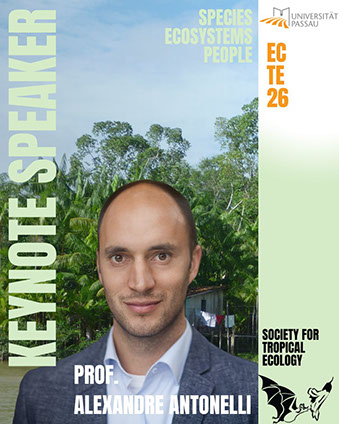
24. February 2026
Illuminating a Global Biodiversity Darkspot
Prof. Alexandre Antonelli (Kew Gardens)
AbstractCenturies of scientific exploration have not yet given us a robust understanding of how many species there are on Earth, let alone what roles they play in ecosystems and how they interact with one another. While a global characterisation remains elusive, in this talk I will present our efforts to take a deep dive into one of the world’s most biodiverse yet threatened biomes: the Atlantic Forest of eastern Brazil. Through a collaboration between academia, industry and policymakers, and integrating new technologies with classical surveys, we are beginning to map and understand the full biological and environmental complexity of the Alto da Figueira private reserve, just 2.5 hours away from Rio de Janeiro. These studies are not only breaking new ground in our understanding of tropical ecology but also informing conservation and restoration practice for the benefit of nature, climate and people.InterviewWhat are you currently working on, and what fascinates you about your research topic?I’m beginning a project aiming at using remote sensing, artificial intelligence and ground-observations to assess the recovery potential of biodiversity and carbon sequestration in degraded forests. We’re focusing on Brazil’s Atlantic Forest, where I’m now also about to open the doors of a new field station we built in the middle of the rainforest, to support research, conservation and training activities. It’s an incredibly beautiful place with great potential for scientific discoveries – my favourite place on Earth! What are your expectations for the conference in Passau?I’m very much looking forward to meeting students and researchers interested in tropical ecology – to learn more about their work and hopefully find new opportunities for collaboration, student exchanges, etc. And I’m also very keen to get to know Passau which seems to be a gorgeous city right at the border with Austria. If you had to describe your research in one sentence, what would it be?I study the distribution, evolution, conservation and sustainable uses of biodiversity and develop methods to speed up scientific discovery and innovation.
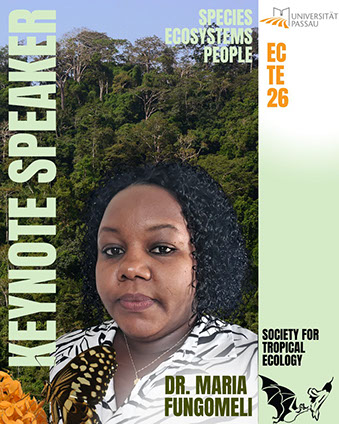
24. February 2026
Biodiversity Patterns in the Kenyan Coastal forests and Conservation Implications
Dr. Maria Fungomeli (National Museums of Kenya)
AbstractTropical ecosystems are among the most biologically rich and diverse ecosystems on Earth. The Kenyan coastal forests, being part of the Eastern Arc and Coastal Forests of Tanzania and Kenya biodiversity hotspot, host a rich biodiversity, including numerous endemic and threatened plant and animal species. They include the culturally significant Kaya sacred forests which hold immense cultural and biological significance. These forest ecosystems are vital not only for supporting rich biological communities but also providing ecosystem services that sustain local livelihoods. However, they are facing unprecedented biodiversity loss, fragmentation, human population pressure, unsustainable land use practices, urbanization, logging and climate change. Protecting biodiversity and species, therefore, requires action beyond formal reserves: it must be guided by science-based conservation strategies across landscapes, where sustainable management can maintain ecological functions, enhance ecosystem resilience, and support both people and nature. Understanding the spatial patterns of species and communities across Kenya’s coastal forests is critical for effective conservation strategies. My research in Kenya’s coastal and Kaya sacred forests exemplifies this approach, combining vegetation and butterfly surveys, socio-ecological, land-use and land-cover change analyses, evolutionary approach, and biodiversity monitoring for conservation. This presentation shares key findings and their implications for biodiversity conservation and policy engagement.InterviewWhat are you currently working on — and what fascinates you personally about your research topic?At present, I am undertaking several interconnected research initiatives, ecological and socio-ecological surveys, all rooted to advancing the ecological understanding and conservation of Kenya’s coastal forests.These projects encompass the monitoring of butterfly species distribution, assessment of forest vegetation dynamics, and investigation of the ecological and climatic drivers influencing biodiversity in fragmented habitats in the coastal forests of Kenya. By integrating ecological data with community engagement, my work aims to support sustainable conservation strategies that protect these vulnerable yet biodiverse environments. What fascinates me most is the profound interconnectedness of all life. Every species plays a vital role in a broader ecological narrative, and I find deep fulfilment in uncovering these intricate relationships, especially when they inform science-based conservation strategies for Kenya’s coastal forests.Beyond, I am deeply passionate about the human-environment dimension of conservation. By collaborating closely with communities adjacent to these forests to promote environmental awareness and sustainable strategies. Seeing these communities embrace conservation, recognizing its ecological importance alongside benefits, is truly where my research comes to life.Ultimately, my motivation stems from the conviction that effective conservation of our forests depends on the collaborative partnership between scientific research and local communities that depend on them, ensuring their protection for generations to come. What contribution do you think the conference can make to international research?The ECTE Tropical Ecology conference serves as a crucial international platform for advancing ecological research and conservation in tropical regions and beyond. By fostering interdisciplinary dialogue, and sharing of cutting-edge scientific knowledge, it is where crucial knowledge is shared that contributes to shaping the future of ecological research and fostering meaningful international collaborations. What advice would you give to young researchers or students interested in tropical ecology?My advice to young researchers or students interested in tropical ecology is to embrace interdisciplinary approaches, as tropical ecosystems are incredibly complex and biodiverse. Collaborate with researchers across disciplines and borders; ecology is rarely a solo pursuit.Not having all the answers at the beginning is part of the journey, stay open-minded and eager to learn. Do not hesitate to reach out to others. Some of the most valuable insights come from meaningful conversations and collaborations. Finally, remember that your work has the power to make a real difference, not only in academia but also in how we understand, protect, and coexist with our natural environments.
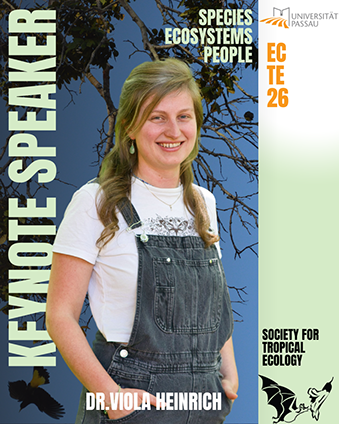
25. February 2026
Putting B before C? Rebalancing Earth Observation for Biodiversity and Carbon
Dr. Viola Heinrich (GFZ Potsdam)
AbstractTropical forests are one of the most biodiverse and productive ecosystems on Earth, playing a crucial role in the global carbon cycle. However, they are increasingly threatened by deforestation, degradation, and climate change. Remote sensing technologies provide unique opportunities to monitor and analyse the dynamics of tropical forest across spatial scales, with applications for operational and policy frameworks. While carbon dynamics have long dominated Earth Observation (EO) driven forest assessments, the growing focus on biodiversity signals a needed diversification of observation priorities. In this talk, I will explore how integrating different observing systems – from satellite to field data – can be used to inform understanding of the extent of degradation and regeneration and the associated carbon fluxes in tropical forests, which are often studied independently. In a world that is dominated by quantifying (aboveground) carbon fluxes from space, other transformations within and between degradation and regrowth forests are often overlooked. Examples from recent workshops will highlight how collaborative EO efforts are beginning to bridge this gap. Ultimately, by integrating numerous platforms for monitoring forests, we can move towards a more comprehensive understanding of tropical forest dynamics—putting not one before the other, but bringing B(iodiversity) and C(arbon) together.InterviewWhat are you currently working on - and what fascinates you personally about your research topic?I focus on developing and using novel Earth Observation methods to quantify post-disturbance tropical forest dynamics, particularly in terms of carbon fluxes. What drives me to do this research on a daily basis is working at the frontier between Earth Observation applications and policy implications of such work, and how science can be made applicable and usable for operational needs, especially for quantifying the forest carbon budget within National Greenhouse Gas Inventory reporting.What contribution do you think the conference can make to international research?ECTE is crucial to build bridges across different research fields in tropical ecology and appreciate the complex biogeographical interactions within the tropics. The conference will be an excellent opportunity to learn first hand of the diverse international research happening across the world, dedicated to tropical ecology.What advice would you give to young researchers or students interested in tropical ecology?It is okay to switch research fields, I went from learning about Antarctic glaciers in my undergraduate, to researching tropical secondary forest in my PhD. Be curious, ask questions, and be open to new ideas, different approaches and collaborations across different research fields. Actively engage with local scientists, whether you are researching DNA of tiny bugs or using global remote sensing data.
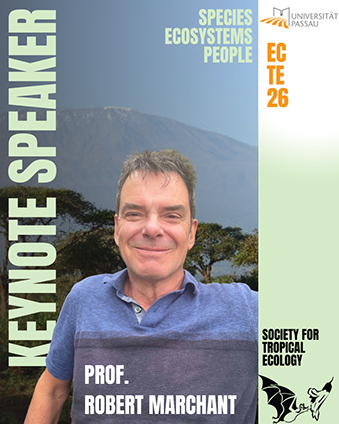
25. February 2026
Embedding the past for balanced future tropical mountain social ecological systems
Prof. Rob Marchant (University of York)
AbstractTropical mountain systems are biodiversity hotspots that sustain billions of people through the production and flow of vital ecosystem services, yet mountains globally are under pressure from a perfect storm of changing climates, growing populations, biodiversity threats and agricultural transformations; challenges that increasingly impact not just mountain communities, but also the surrounding lowlands that rely on highlands for the provision of resources, most obviously water. With the recognition that human systems and ecosystems are now so interlinked that they must be understood as social-ecological systems; in our case mountain socioecological systems. Focussing East African mountain settings, we will explore the past, present and future of mountain social ecological dynamics and how this has evolved over 50,000 years. A new project, AFRI-CAN will showcase how we can apply our new understanding of the drivers of change to co-producing scenarios and pathways of change to inform how tropical worldwide could navigate future opportunities and challenges. Participatory scenario planning can integrate time and space, scientific and local knowledge to foster collective learning and actionable transformation toward resilient, balanced, and biodiversity-positive tropical mountain systems.InterviewWhat are you currently working on - and what fascinates you personally about your research topic?There are a number of themes I am working on around the East African Mountains. Mountains globally are under pressure from a perfect storm of changing climates, growing populations, biodiversity threats and agricultural transformations; challenges that increasingly impact not just mountain communities, but also the surrounding lowlands that rely on highlands for the provision of resources, most obviously water. But such changes have global impacts too, since mountains are often hotspots of biodiversity and act as carbon sinks. The multiple services provided by ecosystems are referred to as Nature's Contribution to People and encapsulated within the Nature's Future Framework. However, there is little appreciation of how mountain socio ecological systems have evolved and how people's interaction with nature has changed and what the drivers of this change have been. We recognize that human systems and ecosystems are now so interlinked that they must be understood as social-ecological systems; in our case mountain socio ecological systems. Focussed on contrasting East African mountain settings, we are combining state-of-the-art modelling and valuation assessments to co-produce pathways for sustainable futures by understanding the past, present and future of MtSES within the Nature's Future Framework that characterises how societies exploit, co-exist with, or enhance nature and how this relationship has evolved.What contribution do you think the conference can make to international research?There are so many great new insights and data presented at conferences such as this - this is where the research agenda is shaped, new collaborations formed and new seeds sown for the future tropical ecology shoots.What advice would you give to young researchers or students interested in tropical ecology?Take opportunities where possible, make opportunities happen by reaching out to people you could be interested in working with and most importantly follow what you enjoy doing - play to your strengths, whatever they could be…
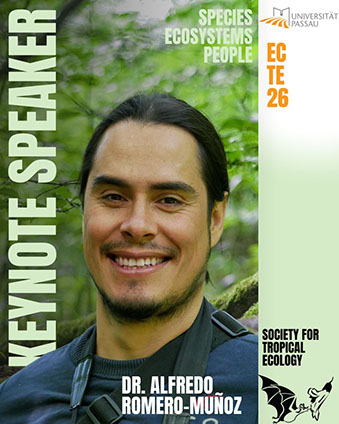
26. February 2026
Impacts of multiple threats on mammal diversity across a global deforestation hotspot
Dr. Alfredo Romero-Muñoz
(Humboldt-Universität zu Berlin)
AbstractUnderstanding how multiple threats impact biodiversity across space and time is essential for effective conservation, yet global-scale studies typically use coarse resolutions and lack species-specific assessments. We used spatially explicit habitat and individual-based models to assess habitat destruction and overexploitation impacts across the 1.1 million km² Gran Chaco, a deforestation hotspot driven by beef and soy expansion. Over three decades, threat impacts expanded beyond deforested areas, causing widespread loss of high-quality habitat for jaguars, large mammals, and across all mammalian diversity facets (taxonomic, phylogenetic, functional). Jaguar and puma populations declined 88% and 80% respectively, with top carnivore guild function lost across 67% of the Chaco and concurrent strong declines across 61% of their historical co-occurrence - far exceeding extirpation zones. Both threats contributed substantially, with relative importance varying among species and diversity facets. Synergistic threat areas increased over time, exacerbating losses. Large protected areas served as critical strongholds, though threat impacts intensified at boundaries. Assessing multiple threats simultaneously at conservation-relevant scales can directly inform complementary proactive and reactive strategies to prevent further biodiversity decline.InterviewWhat are you currently working on, and what fascinates you about your research topic?I am assessing the cost-effectiveness of conservation strategies for large predators in the Chiquitano and Chaco dry forests of South America, using collaborative approaches and population modeling.Following intensive field seasons, our team is currently processing extensive acoustic and camera trapping data to understand the impacts and opportunities of land use and hunting on biodiversity across different socio-ecological systems.What excites me most is identifying which conservation actions and management practices – and where to implement them – would result on the greatest benefits for biodiversity in one of the world's most threatened regions. What are your expectations for the conference in Passau?I am thrilled to join the European Conference of Tropical Ecology 2026 in Passau. The conference’s focus on interactions between species, ecosystems, and people is very timely and addresses some of the most pressing challenges in tropical conservation. It is, however, quite challenging to confront in research. Therefore, I am particularly looking forward to learning from diverse approaches to these complex questions. I am sure that hearing other researchers’ work on these will inspire my own research. This will also be my first time visiting Passau, and I'm hoping to explore the beautiful nature along the Danube! If you had to describe your research in one sentence, what would it be?Identifying effective conservation responses in expanding agricultural frontiers.
